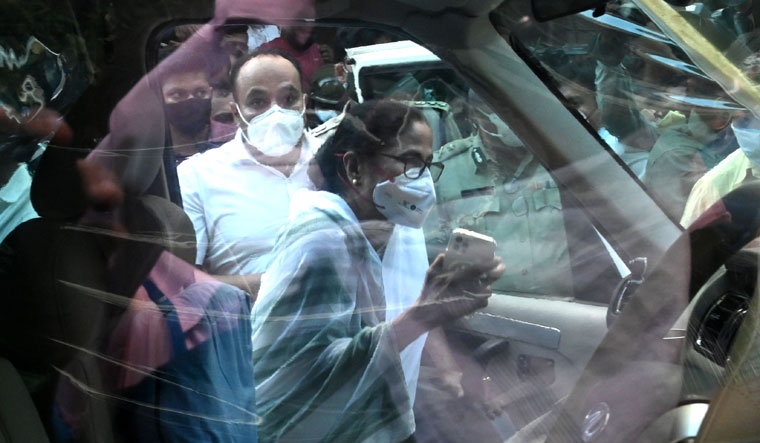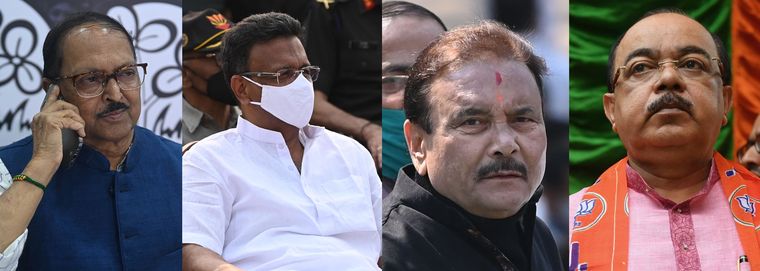Mamata Banerjee has a reputation for being fiercely protective of those who matter to her. When the CBI arrested her political mentor Subrata Mukherjee and close associates Firhad Hakim and Madan Mitra on May 17, the West Bengal chief minister went straightway to the Nizam Palace, the agency’s eastern region headquarters in Kolkata. And when Banerjee goes somewhere, people follow. Hundreds of men marched with her to the CBI office.
For Mukherjee, 75, who played a crucial role in bringing Banerjee to politics, it was the darkest day in his political career. He was arrested for taking a bribe during a sting operation carried out by Mathew Samuel of Narada News in 2016. It was probably the only blip in Mukherjee’s otherwise clean career. He was only 27 when chief minister Siddhartha Shankar Ray had entrusted him with seven departments. Today he is a key driver for rural growth in the Banerjee government. The CBI said he was “seen to have accepted the illegal gratification of Rs5 lakh”.
Transport minister Hakim, who is also the administrator of Kolkata Corporation, plays a key role in the government’s drive against the Covid-19 pandemic in the city. He was not seen taking money in the sting video. The CBI said he was “seen to have agreed for acceptance of bribe money of Rs5 lakh”.
Former transport minister Mitra was earlier arrested by the CBI in Saradha Chit Fund scam case and was in jail for almost two years. The CBI said he was “seen to have accepted the illegal gratification of Rs5 lakh”.
The fourth man on the list, former Kolkata mayor Sovan Chatterjee, was a minister when he was seen accepting money. He left the Trinamool for the BJP but quit the saffron party because he did not get the desired seat in the assembly election. Apparently, he wants to go back to the Trinamool. The CBI said he was “seen to have accepted illegal gratification of Rs4 lakh”.
At the Nizam Palace, Banerjee demanded the release of her colleagues. She asked deputy inspector general Akhilesh Kumar Singh to arrest her as well otherwise. Singh even sent a message to Delhi asking how to handle her. The Trinamool’s legal team soon secured bail for Mukherjee, Hakim and Mitra from the CBI magistrate's court. Chatterjee could not be an exception and he also got bail along with the others.
The CBI went to the Calcutta High Court the same evening against the bail order. It also complained to the court about the sit-in by Banerjee and some 3,000 of her supporters at the CBI office and requested it to shift the CBI court to a neighbouring state. The High Court ordered a stay of the bail the following day. The case most likely will be dragged to the Supreme Court.
Banerjee has made her party’s position clear and her supporters argued that the arrests were ill-timed, particularly so in view of the pandemic. Her lawyers had also pointed out to the CBI court recent Supreme Court directives against making unnecessary arrests.
Banerjee had assigned Kalyan Banerjee, her key legal aide, to fight the case in the court before she went to the CBI office. She had also consulted legal experts in Delhi on how to proceed, in case the bail application was dismissed. She declared: "The CBI has clearly been instructed by some people in the BJP. In Bengal, their biggest adviser is the governor, Jagdeep Dhankhar, who has no right to stay in this state."
Banerjee had hit the streets in a similar way when Kolkata police commissioner Rajeev Kumar was wanted by the CBI in the Saradha case in February 2019. She played the same game that time—simultaneously creating public opinion and the legal defence. Kumar’s case is pending in the Supreme Court.
The CBI has taken many a misstep in the case. Despite testing voice samples from the sting video, it dithered over arresting the accused at the right time. The agency said it had sent petitions to the Lok Sabha speaker and the West Bengal governor for permission to prosecute the people's representatives. “From the governor, we received the sanction just last week, on May 7,” said an officer.
Lok Sabha speaker Om Birla is yet to give sanction for prosecuting four MPs accused in the case—Sougata Roy, Kakoli Ghosh Dastidar, Aparupa Poddar and Suvendu Adhikari (he was MP in 2016). Mukul Roy, another accused, was a Rajya Sabha member. Interestingly, Adhikari and Roy are now BJP legislators. That the BJP was not serious about pursuing the case was evident when the previous parliament ethics committee under L.K. Advani was asked to look into the allegations against the MPs. “The committee met not even once," said an MP from Bengal.
Arunava Ghosh, one of the two lawyers who had gone to court for CBI investigation of the sting operation, said waiting for permissions was nothing but a lame excuse by the CBI. “All these leaders could have been tried and prosecuted under the Prevention of Corruption Act long back. No sanction is required from the speaker, chairman or governor. The CBI could have acted long back. But it did not, and it became hyperactive during the pandemic,” said Ghosh.
Kunal Ghosh, the spokesperson for the Trinamool, said if the CBI had guts it should arrest Adhikari and Roy as well. But the agency sources said there was a difference between what MLAs and MPs do and what ministers do. While ministers are government servants, MPs and MLAs are all people's representatives. Arunava Ghosh, however, refuted it, saying “the Prevention of Corruption Act cases don’t differentiate between ministers and people’s representatives.”
The Trinamool says the sudden surge in the CBI’s interest in the case is nothing but political retaliation. “The truth is the CBI has become the puppet of the Modi government. There is rampant misuse of this autonomous investigating agency,” said Sougata Roy.
An academic close to the Trinamool said the BJP was unable to handle the politics at the ground level, where its workers were fleeing, and the CBI was its weapon of resistance. The arrests, however, will remain a learning experience for India’s premier investigating agency.



